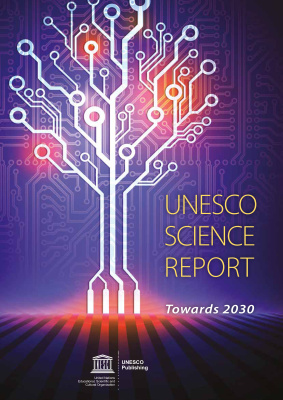UNESCO Publishing.— Paris, 2015.
Архив содержит 2 файла - сокращенное содержание на русском языке (47 стр.) и полная версия "UNESCO Science report towards 2030" на английском (820 стр.). Содержание:
Мир в поисках эффективной стратегии роста.
Ключевые факторы, оказывающие влияние на политику и управление в области НТИ.
Глобальные тенденции в области расходов на НИОКР.
Глобальные тенденции в области человеческого капитала.
Тенденции в области генерации знаний.
Более подробный анализ положения дел в отдельных странах и регионах.
Заключение. Content:
Foreword.
Perspectives on emerging issues.
Universities: increasingly global players.
A more developmental approach to science.
Science will play a key role in realizing Agenda 2030.
Science for a sustainable just world: a new framework for global science policy? .
Local indigenous knowledge at the science–policy interface.
Global overview.
A world in search of an effective growth strategy.
Tracking trends in innovation mobility.
Is the gender gap narrowing in science engineering? .
A closer look at regions countries.
Canada.
United States of America.
Caricom.
Latin America.
Brazil.
European Union.
Southeast Europe European Free Trade Association Countries in the Black Sea basin.
Russian Federation.
Central Asia Iran Israel.
The Arab States.
West Africa.
East Central Africa.
Southe Africa.
South Asia.
India.
China.
Japan.
Republic of Korea.
Malaysia.
Southeast Asia Oceania.
Annexes.
Composition of regions subregions.
Glossary.
Statistical annex.
Illustrations.
Архив содержит 2 файла - сокращенное содержание на русском языке (47 стр.) и полная версия "UNESCO Science report towards 2030" на английском (820 стр.). Содержание:
Мир в поисках эффективной стратегии роста.
Ключевые факторы, оказывающие влияние на политику и управление в области НТИ.
Глобальные тенденции в области расходов на НИОКР.
Глобальные тенденции в области человеческого капитала.
Тенденции в области генерации знаний.
Более подробный анализ положения дел в отдельных странах и регионах.
Заключение. Content:
Foreword.
Perspectives on emerging issues.
Universities: increasingly global players.
A more developmental approach to science.
Science will play a key role in realizing Agenda 2030.
Science for a sustainable just world: a new framework for global science policy? .
Local indigenous knowledge at the science–policy interface.
Global overview.
A world in search of an effective growth strategy.
Tracking trends in innovation mobility.
Is the gender gap narrowing in science engineering? .
A closer look at regions countries.
Canada.
United States of America.
Caricom.
Latin America.
Brazil.
European Union.
Southeast Europe European Free Trade Association Countries in the Black Sea basin.
Russian Federation.
Central Asia Iran Israel.
The Arab States.
West Africa.
East Central Africa.
Southe Africa.
South Asia.
India.
China.
Japan.
Republic of Korea.
Malaysia.
Southeast Asia Oceania.
Annexes.
Composition of regions subregions.
Glossary.
Statistical annex.
Illustrations.

